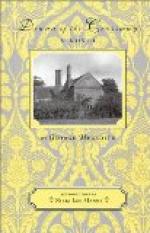He had met Sullivan Smith accidentally in the morning and accepted the invitation to meet young Rhodes, because these two, of all men living, were for the moment dearest to him, as Diana Warwick’s true and simple champions; and he had intended a perfect cordiality toward them both; the end being a semi-wrangle with the patriot, and a patronizing bluntness with the boy; who, by the way, would hardly think him sincere in the offer of a seat at his table. He owned himself incomplete. He never could do the thing he meant, in the small matters not leading to fortune. But they led to happiness! Redworth was guilty of a sigh: for now Diana Warwick stood free; doubly free, he was reduced to reflect in a wavering dubiousness. Her more than inclination for Dacier, witnessed by him, and the shot of the world, flying randomly on the subject, had struck this cuirassier, making light of his armour, without causing any change of his habitual fresh countenance. As for the scandal, it had never shaken his faith in her nature. He thought of the passion. His heart struck at Diana’s, and whatever might by chance be true in the scandal affected him little, if but her heart were at liberty. That was the prize he coveted, having long read the nature of the woman and wedded his spirit to it. She would complete him.
Of course, infatuated men argue likewise, and scandal does not move them. At a glance, the lower instincts and the higher spirit appear equally to have the philosophy of overlooking blemishes. The difference between appetite and love is shown when a man, after years of service, can hear and see, and admit the possible, and still desire in worship; knowing that we of earth are begrimed and must be cleansed for presentation daily on our passage through the miry ways, but that our souls, if flame of a soul shall have come of the agony of flesh, are beyond the baser mischances: partaking of them indeed, but sublimely. Now Redworth believed in the soul of Diana. For him it burned, and it was a celestial radiance about her, unquenched by her shifting fortunes, her wilfulnesses and, it might be, errors. She was a woman and weak; that is, not trained for strength. She was a soul; therefore perpetually pointing to growth in purification. He felt it, and even discerned it of her, if he could not have phrased it. The something sovereignty characteristic that aspired in Diana enchained him. With her, or rather with his thought of her soul, he understood the right union of women and men, from the roots to the flowering heights of that rare graft. She gave him comprehension of the meaning of love: a word in many mouths, not often explained. With her, wound in his idea of her, he perceived it to signify a new start in our existence, a finer shoot of the tree stoutly planted in good gross earth; the senses running their live sap, and the minds companioned, and the spirits made one by the whole-natured conjunction. In Booth, a happy prospect for the sons and daughters of Earth, divinely indicating more than happiness: the speeding of us, compact of what we are, between the ascetic rocks and the sensual whirlpools, to the creation of certain nobler races, now very dimly imagined.




